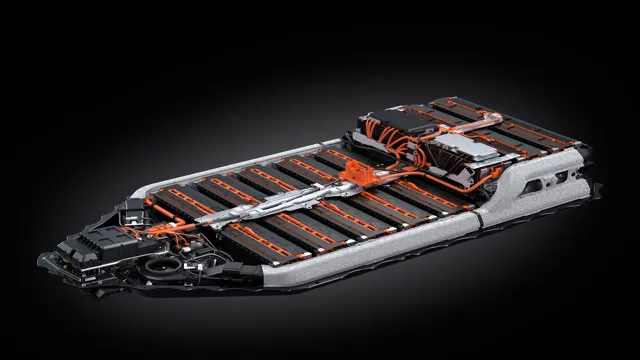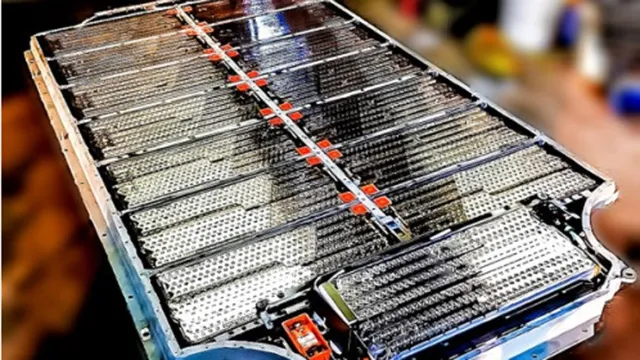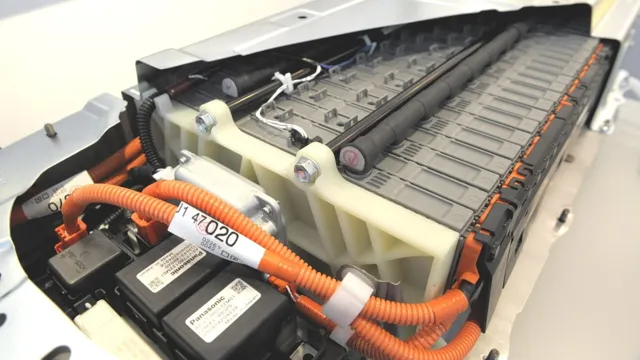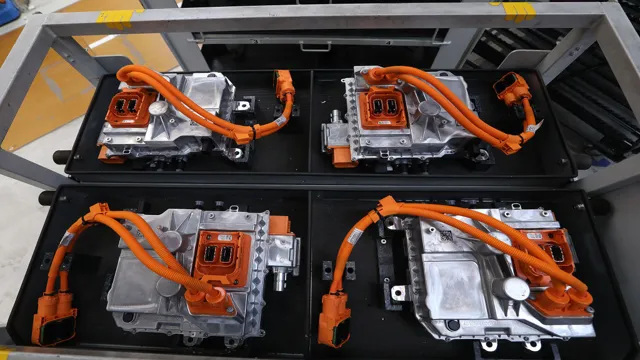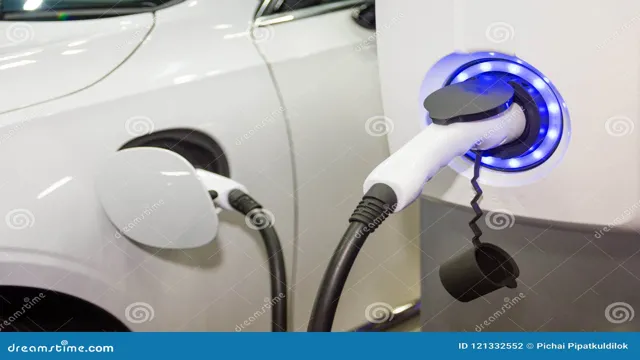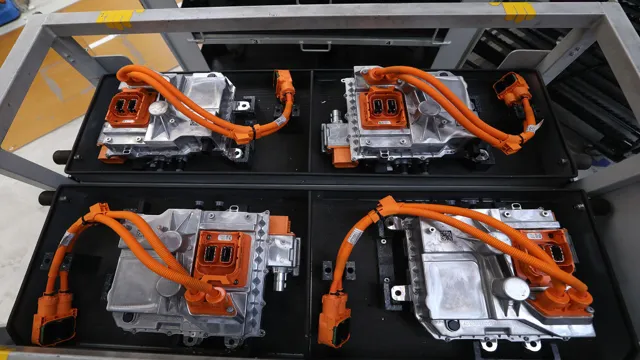Rev Up Your Electric Ride with High-Performance Battery Cells: Exploring the Latest Innovations
Electric cars are becoming an increasingly popular choice among environmentally conscious consumers. With the ability to provide a greener alternative to traditional gas-powered vehicles, electric cars are paving the way for a more sustainable future. While most people are aware of the basic mechanics of electric cars, many don’t realize the crucial role that battery cells play in making these vehicles run.
Battery cells are essentially the heart of electric cars, providing the power and energy needed to keep the car running. In this blog post, we’ll explore the power behind electric cars and shed some light on the importance of battery cells. So buckle up and let’s explore this electrifying topic together!
What are Battery Cells?
Battery cells are the heart of any electric car. Essentially, they are compact and durable rechargeable batteries that store electrical energy and then release it to power the vehicle’s motor. The most common type of battery cells for electric cars is lithium-ion because they offer a high energy density and can be recharged multiple times.
These cells are made up of two electrodes, a positive and negative, separated by a thin polymer or ceramic membrane. The electrolyte, which is a substance that conducts electricity, is then added to the electrodes. When the battery is discharged, the positive electrode releases lithium ions that move towards the negative electrode, creating a flow of energy that powers the car.
Battery cells are svelte and can be stacked together to form larger battery packs that offer longer ranges and faster charging times, making them ideal for electric cars.
Explaining the Fundamentals of Battery Cells
Battery cells are the fundamental building blocks of any battery. Essentially, they are small electrochemical devices that can turn chemical energy into electrical energy. These cells are the reason why we have portable electronic devices, because they are able to store and produce energy that powers our laptops, smartphones, and other gadgets.
Each battery cell is made up of different parts, including an anode, a cathode, and an electrolyte. The anode and cathode are the electrodes that allow electrons to flow through the cell, and the electrolyte is the medium through which the ions move. When a battery is being used, the anode releases electrons that travel to the cathode through a wire, creating a flow of electricity that can power devices.
Understanding the basics of battery cells is crucial to understanding how batteries work, as each individual cell plays a key role in the overall performance of the battery.
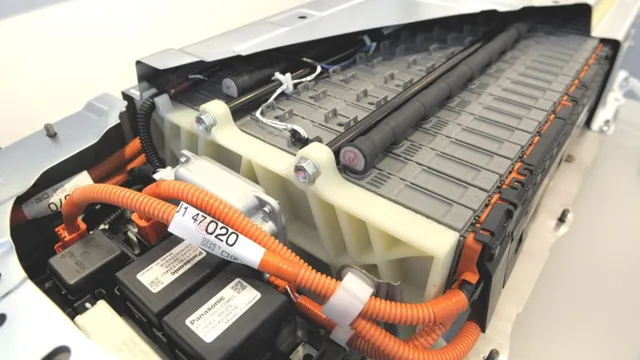
Different Types of Battery Cells and their Applications
Battery cells are the building blocks of any type of battery. They come in various shapes and sizes, and each type has its own unique characteristics. The most common battery cells are lithium-ion, nickel-cadmium, nickel-metal hydride, and lead-acid.
Lithium-ion batteries are lightweight, compact, and widely used in portable electronics, electric vehicles, and renewable energy systems. Nickel-cadmium batteries are durable and can withstand high temperatures, making them popular in industrial applications. Nickel-metal hydride batteries have a higher energy density than nickel-cadmium batteries, making them useful in portable electronics such as laptops and smartphones.
Lastly, lead-acid batteries are commonly used in vehicles and backup power systems due to their low cost and high reliability. It’s essential to choose the right battery cell for its intended purpose to maximize its performance and longevity. A battery with high energy density might be ideal for portable electronics, while a battery that can withstand high temperatures might be better suited for industrial applications.
Understanding the different types of battery cells and their unique characteristics will help you make an informed decision when selecting a battery for your device or application.
Why are Battery Cells Important for Electric Cars?
Battery cells for electric cars play a vital role in powering the vehicle. They are responsible for storing and releasing energy, so ensuring their reliability and durability is essential in making electric cars a viable option for consumers. The quality and capacity of the battery cells can impact the range and performance of the vehicle, which affects the overall driving experience.
It’s also important to note that while advancements have been made in battery technology, the cost of manufacturing them is still high, leading to higher prices for electric cars. As more research is done, battery cells will likely continue to be improved, making electric cars more efficient and accessible for more people.
Battery Cells are the Heart of Electric Cars
Battery cells are the heart of electric cars, and they are vital components that help power these vehicles. The main reason why battery cells are so important for electric cars is that they are required to store and provide energy to the electric motor. Electric cars operate on rechargeable batteries, and the better the battery cells, the longer and more reliable the car’s performance.
In addition, the quality and capacity of battery cells can also directly affect the range and driving experience of the electric car. Therefore, battery cells are critical to the overall performance and success of electric cars. Without them, it would not be possible to maximize the potential of electric cars and provide a sustainable alternative to traditional gasoline-powered vehicles.
As such, it is no surprise that advances in battery technology are continually being made to improve battery cells and provide enhanced driving range, efficiency, and performance.
Benefits of Using High-Quality Battery Cells
When it comes to electric cars, battery cells are an essential component that determines the performance and reliability of the vehicle. High-quality battery cells provide numerous benefits, including longer range, faster charging times, and increased lifespan. By using high-quality battery cells in electric cars, car manufacturers can provide customers with a better driving experience.
Batteries with more energy-dense cells can increase the range of a car, allowing drivers to travel further without needing to recharge. Additionally, high-quality battery cells can withstand more cycles and maintain their capacity over an extended period, which reduces the need for replacements and saves money in the long run. Overall, the quality of battery cells is crucial to the success of electric cars, and car manufacturers must prioritize this component to provide their customers with the best possible experience.
Challenges of Using Battery Cells in Electric Cars
Battery cells are the backbone of electric cars. They are responsible for storing and supplying the energy necessary to power electric vehicles. Without these cells, electric cars would never have been possible.
The most common type of battery cell used in electric cars is the lithium-ion battery cell. However, these batteries present various challenges when it comes to electric car manufacturing. For example, these batteries are bulky and require specialized handling.
Additionally, they are expensive, which makes the cost of electric cars higher than gasoline-powered cars. Moreover, the performance and efficiency of these batteries decrease as they age. As a result, electric car manufacturers continuously invest in research and development to find alternative, more affordable, smaller and more efficient battery cells to power electric cars.
Choosing the Right Battery Cells for Your Electric Car
When it comes to choosing the right battery cells for your electric car, there are a few important factors to consider. First and foremost, you’ll want to think about the type of cells that are best suited for your particular vehicle and driving needs. Lithium-ion batteries are the most common type of battery used in electric cars today, due to their high energy density and long cycle life.
However, there are also other options available, such as nickel-metal hydride batteries or solid-state batteries, which may offer certain advantages depending on your specific requirements. Additionally, you’ll want to consider factors such as the capacity, voltage, and overall cost of the battery cells, as well as the reputation and reliability of the manufacturer. Ultimately, choosing the right battery cells for your electric car is a crucial decision that will have a significant impact on the performance, efficiency, and longevity of your vehicle, so it’s important to do your research and consult with experts in the field before making your final choice.
Factors to Consider When Selecting Battery Cells
Choosing the right battery cells for your electric car is essential because it affects the vehicle’s performance. When selecting battery cells, there are several factors to consider, including the type of chemistry, the voltage, and the capacity. Lithium-ion batteries are commonly used in electric cars due to their high energy density, low self-discharge rate, and long life cycle.
It’s also critical to choose the appropriate voltage and capacity to ensure that the battery can provide enough power to the motor while also delivering a sufficient range. Additionally, you should take into account the temperature range in which the battery will operate and the charging time required. Considering these factors will help you choose the right battery cells for your electric car and optimize your driving experience.
Top Battery Cell Manufacturers for Electric Cars
When it comes to electric cars, one of the most crucial components is the battery cells that power them. With so many different manufacturers on the market, it can be difficult to determine which one is the best for your specific vehicle. However, there are a few names that stand out among the rest when it comes to quality, reliability, and efficiency.
One of the top battery cell manufacturers for electric cars is Tesla, which is known for its high-performance, long-lasting cells. Another popular option is LG Chem, which provides a range of different cells suitable for different types of electric vehicles. Panasonic is also a leader in the electric car battery market, with its cells providing excellent energy density and power output.
Choosing the right battery cells for your electric car is essential to ensuring a smooth and efficient ride, so it’s worth taking the time to do some research and find the best option for your vehicle.
The Future of Battery Cells for Electric Cars
Battery cells for electric cars have been a driving force behind the increased popularity of electric cars in recent years. But what does the future hold? As battery technology advances, so does the potential for longer driving ranges, quicker charging times, and lower costs. Some experts predict that solid-state batteries will be the next big thing in electric car batteries, offering higher energy densities and improved safety.
Others believe that lithium-ion batteries will continue to dominate, with incremental improvements in efficiency and cost-effectiveness. Regardless of which technology wins out in the end, it’s clear that battery cells will play a significant role in the future of electric cars. With continued investment and innovation, we can expect to see even better performance and more widespread adoption of electric vehicles in the years to come.
Conclusion
In conclusion, battery cells for electric cars are the power source that keeps the wheels turning and the environment clean. Offering impressive range, speed, and efficiency, these tiny powerhouses are the key to unlocking a sustainable future for all of us. So whether you’re looking to reduce your carbon footprint or simply want to zoom past gas stations with a smug grin on your face, battery cells for electric cars are the way to go.
As Thomas Edison once said, “I’d put my money on the sun and solar energy. What a source of power! I hope we don’t have to wait until oil and coal run out before we tackle that.” Clearly, battery cells for electric cars are a vital step towards realizing Edison’s vision, and we’re excited to see them continue to evolve and revolutionize transportation for years to come.
So go ahead, get behind the wheel of an electric car, and enjoy a quieter, cleaner, and brighter ride towards a better future.
FAQs
What type of battery cells are commonly used in electric cars?
Lithium-ion battery cells are the most common type of battery cells used in electric cars today.
How long do battery cells for electric cars last before needing to be replaced?
The lifespan of battery cells for electric cars can vary, but they typically last between 8-10 years or 100,000-200,000 miles before needing to be replaced.
Can battery cells for electric cars be recycled?
Yes, battery cells for electric cars can be recycled. Most of the materials in the cells, such as lithium and cobalt, can be reused to make new batteries or other products.
How does the size of battery cells affect the range of an electric car?
The size of the battery cells directly affects the range of an electric car. The larger the battery, the more energy it can store, and the longer the range of the car. This is why electric cars with larger batteries, such as the Tesla Model S, have longer ranges than those with smaller batteries.

